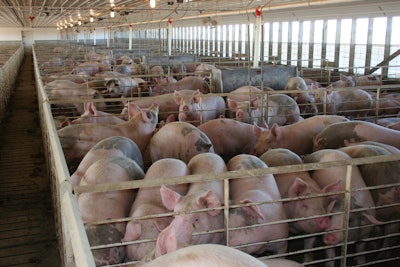
RALEIGH, N.C. (AP) — Trials that could alter the operations and profitability of eastern North Carolina's pork industry will start in April, a federal judge decided Monday. U.S. District Judge W. Earl Britt said trials on the lawsuits filed by more than 500 neighbors of industrial-scale hog operations will begin with two test cases.
The litigation by often-poor neighbors represents one of the biggest legal and financial threats to pork producers since industrial-scale hog farming took off a generation ago. Hogs were a $21 billion industry nationwide in 2015, with North Carolina operations racking up $2.3 billion of that, according to the U.S. Agriculture Department.
The neighbors contend operations confining thousands of animals create intense nuisances like smells, noise and clouds of flies. Neighbors also have complained that wind-driven spray sometimes coats home exteriors in liquefied excrement and the smell clings to clothes.
Britt said the initial trial will involve eight to 10 households with similar complaints chosen by their lawyers. The second case following two weeks after the first trial ends will focus on the experience of a single plaintiff household chosen by livestock company Murphy-Brown's lawyers, who said a narrowed focus was needed to understand potential liability.
New trials then would start every month until the cases are decided, dismissed or settlements are reached.
Trials reviewing the complaints of just one or two plaintiffs are needed to avoid confusing jurors, who will have to consider the location of other nearby livestock operations, how neighbors specifically use their land, and how living near hog farms affects each person individually, said an attorney representing Murphy-Brown, a subsidiary of Virginia-based pork giant Smithfield Foods.
"That sort of testimony is specific to each property," lawyer Tennille Checkovich said. "Trials involving larger groups is going to lead to prejudice." Smithfield was bought in 2013 by a division of China-based WH Group, the world's largest pork producer.
Neighbors aren't claiming any health harms by hog operations, so a handful of trials involving groups of many plaintiffs would be best, said Mike Kaeske, one of several Texas-based attorneys working with a North Carolina firm to take on politically powerful pork producers.
"There are only so many different ways somebody can say, 'When I go outside, it stinks,'" Kaeske said.
North Carolina legislators this year considered derailing the pending lawsuits with a law limiting damages farming and forestry operations could face. The move was aimed at undercutting attorneys willing to represent neighbors with the promise that if they win they would take a cut of liability awards. The law was amended to apply for cases filed in the future.





















